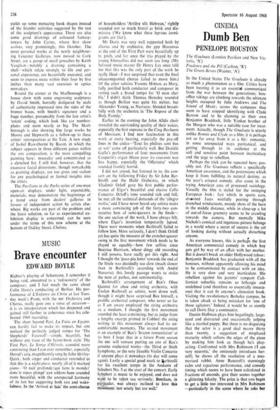Brave encounter MUSIC
EDWARD BOYLE
Richter's playing of Schumann, I remember it being said, amounted to a 'rediscovery' of the composer, and I feel much the same about Colin Davis's conducting of Berlioz. His per- formance of L'Enlance du Christ at last Tues- day week's Prom, with the BBC Orchestra and Chorus, really gave one a sense of occasion— it is an interpretation which has deepened and gained still further in coherence since his cele- brated 1960 recording.
The short Second Part, La Fuite en Egypte, can hardly fail to make its impact, but one noticed the perfectly judged tempo for The Shepherds' Farewell'—simple, heartfelt, but without any trace of the hymn-book style. The First Part, Le Songe d'Herode, sounded more convincing than I can ever remember, especially Herod's aria, magnificently sung by John Shirley- Quirk; both singer and conductor reminded us that this is a night-piece, nearly all of it marked piano—`0 nuit profonde/qui tiens le monde/ dans le repos plonge can seldom have sounded more beautiful, with the unexpected harmony of its last bar suggesting both rest and wake- fulness, In the 'Arrival at Sais' the semi-chorus of householders 'Arriere vils Hebreux,' rightly sounded not so much brutal as brisk and dis- missive ('We know what these leprous immi- grants are like').
Mr Davis was very well supported both by chorus and by orchestra; the ppp Hosannas at the end of the First Part were beautifully up to pitch, and for once the trio played by the young Ishmaelites did not seem too long. (My beloved music master Dr Henry Ley once told me that this was the only part of the work he really liked—I was surprised that even the final unaccompanied chorus failed to move him.) Of the other soloists Yvonne Minton, as MarY, fully justified both conductor and composer in setting such a broad tempo for '0 mon cher fils.' I didn't think Thomas Hemsley sounded as though Berlioz was quite his métier, but Alexander Young, as Narrator, blended beauti- fully with the orchestra in 'The Repose of the Holy Family.'
Earlier in the evening the John Alldis choir revealed the outstanding quality of their voices, especially the first soprano in the Cinq Rechants of Messiaen; I find new fascination in this work at every hearing, especially the pay-off lines in the codas—`Tout les philtres sont bus ce soir' came off particularly well. But Daniele Gullo's performance of four movements from Couperin's organ Messe pour les couvents was less happy, especially the 'Offertoire' which sounded frankly horrid.
I did not attend, but listened in to, the con- cert on the following Friday by Sir John Bar- birolli and the Halle Orchestra, in which Vladimir Orloff gave his first public perfor- mance of Elgar's beautiful and elusive Cello Concerto. Orloff's tone sounded rich and full, he met all the technical demands of the 'allegro molto,' and I have never heard any soloist make a more convincing job of the forty-two con- secutive bars of semi-quavers in the finale— the one section of the work, I have always felt, where Elgar's invention temporarily lapsed. There were moments when Barbirolli failed to follow him. More seriously, I don't think Orloff yet has quite the measure of the crotchet-quaver swing in the first movement which needs to be played so equably—how few cellists since Beatrice Harrison, whose dingy old recording I still possess, have really got this right. And I thought the 'poco piu lento' towards the end of the finale was decidedly too slow (much slower than in Barbirolli's recording with Andr6 Navarra); this lovely passage wants to strike the note of pathos, not sentimentality.
Barbirolli's arrangement of Bax's Oboe Quintet for oboe and string orchestra, with Evelyn Rothwell as soloist, went down well, though it might have surprised Bax himself, a prolific orchestral composer, who never so far as I am aware employed the string orchestra as a medium. I thought the first movement sounded the least convincing, but to judge from a lengthy excerpt printed in Cobbett the string writing in this movement always had its un- comfortable moments. The second movement is an example of Bax's 'brazen romanticism' at its best. I hope that in a future Prom season the BBC will venture putting on one of Bax's genuine orchestral works—the Third or Sixth Symphony, or the very likeable Violin Concerto if anyone plays it nowadays (its day will come again). Lastly a special good mark to liarbirolli for his excellent tempo in the Andante of Schubert No. 5 at the start of the concert. Early Schubert is music to be enjoyed, and does not Wail to be taken too seriously; Beecham, in prrtieular, was always inclined to love this movement not wisely but too well,'


































 Previous page
Previous page